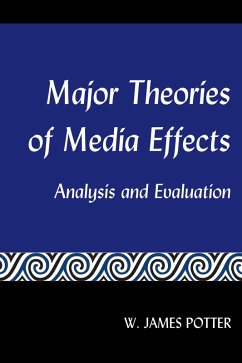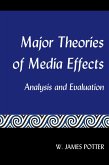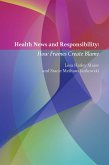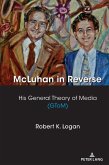In Major Theories of Media Effects, six major theories of media effects are thoroughly analyzed and then evaluated to construct a picture of the current state of knowledge in the scholarly field of media effects. These six theories are cultivation, agenda setting, framing, uses and gratifications, social learning, and third person effect. Each of these six theories is examined in detail using fourteen analytical dimensions organized into four categories: how the theory was originally conceptualized, its original components, patterns of empirical testing of its claims, and how the theory has developed over time. The theories are then compared and contrasted along five evaluation dimensions (scope, precision, heuristic value, empirical validity, and openness), plus one summary evaluative dimension that compares their overall utility to generating knowledge about media effects. The insights generated through these analyses and evaluations are used to address questions such as: "What is a theory?"; "Who qualifies as a theoretician?"; and, "Within the scholarly field of media effects, why are there so many theories yet so little theory usage as foundations for empirical studies?"
Concise and accessible analyses of major media effects theories-alongside helpful reference lists that handily index important literature in the field-make Major Theories of Media Effects both a vital reference for scholars and a valuable textbook for graduate and advanced undergraduate courses in media studies.
Concise and accessible analyses of major media effects theories-alongside helpful reference lists that handily index important literature in the field-make Major Theories of Media Effects both a vital reference for scholars and a valuable textbook for graduate and advanced undergraduate courses in media studies.
Dieser Download kann aus rechtlichen Gründen nur mit Rechnungsadresse in A, D ausgeliefert werden.









